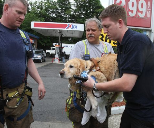What happened to my guide dog after he saved my life?
by Beth
A guide dog who saved his blind companion from getting hit by a mini-bus has been getting a lot of attention in the media. And well he should! A story in last Tuesday’s USA Today reports that the driver of a school bus in Brewster, N.Y., told police he didn’t see Audrey Stone and her guide dog Figo crossing the road as they made their way home. After the accident, Audrey was rushed by ambulance to a hospital while the Brewster Fire Department rushed her heroic guide dog to a vet. Both were hurt, but sources say both are recovering well:
Stone, 62, suffered a fractured right elbow, three broken ribs, a fractured ankle and a cut to her head in the accident, said Brewster Police Chief John Del Gardo. Figo’s leg was cut down to the bone, said Paul Schwartz, who manages the Extra Mart gas station at the intersection and ran to the scene.
The lead to the story in USA Today claimed that Golden Retriever Figo’s “protective instincts kicked in” to save his human companion, and while that may be true, it’s only a part of it.
Guide dog schools spend months teaching dogs to pull their blind companions back should oncoming vehicles come too close, and when we humans arrive at the schools to train with our new dogs, we practice over and over and over how to react to the dogs and move backwards with them, away from harm, should something like that happen.

Harper is very happy in his well-earned retirement, living with friends in a quiet suburb and hanging out with a neighbor — a Collie named Beau.
I have received all four of my dogs from the Seeing Eye school. With each one I’ve stayed there in Morristown, N.J., three weeks to learn how to work with that new dog before flying back home to Chicago. After the first week of training, Seeing Eye staff start heading out in vehicles to intentionally cut in front of us, simulating the very real behavior of drivers like that bus driver in New York.
All four of my dogs routinely refused to step into the street if they saw a vehicle barreling toward us, and if a car cut in front of us in the intersection, these dogs knew to pull me back from harm’s way. Otherwise they would never have been placed with a blind person as a Seeing Eye dog. All four of my dogs have saved us from multiple near misses, but the near-miss I had with my third dog Harper was too close for comfort.
Harper and I were at a busy Chicago intersection in 2012, and hearing cars going straight at our parallel, I commanded, “Harper, forward!” We’d taken a few steps into the intersection when a woman in a van turned the corner right in front of us.
Harper pulled us back with such force that I fell backward, cracking the back of my head on the concrete. The woman driving the van said later that she hadn’t seen us crossing the intersection. Harper saved our lives.
My husband Mike inspected the harness later and discovered it was bent. I Suspect Harper was clipped by the car. Seeing Eye instructors told me that after a near-miss like this, guide dogs tend to do one of three things:
- Brush it off as to say, Hey, we almost got hit!” and just keep working
- Need a little retraining before they get their confidence back
- Never feel confident again and have to retire
Harper started showing fear around traffic after the near-miss. Three Seeing Eye trainers came one after another to help retrain him, but nothing worked. Harper trembled around traffic, his head down, his tail between his legs. City life had become too much for him.
The Seeing Eye staff members who’d come to visit us met in Morristown afterward to discuss Harper’s future. Could they bring him back to the Seeing Eye for retraining? Place him with some other blind person, one who lived in a calmer environment?
The head of training phoned me after their meeting. Harper would not be retrained, he said. I could go ahead and find friends to adopt him. I was crushed. So much time, energy and money had gone into training Harper. I’d hoped he could be placed with someone else so that all that effort wouldn’t have to go to waste.
Hearing the disappointment in my voice, the trainer on the other end of the phone assured me that the Seeing Eye’s hard work — and Harper’s training — had not been wasted at all. “Harper took a bullet for you,” he said. “And for that, he’s earned an early retirement.”







